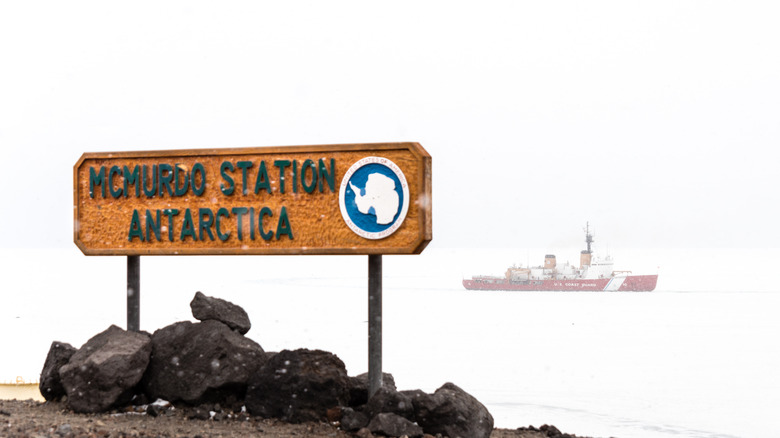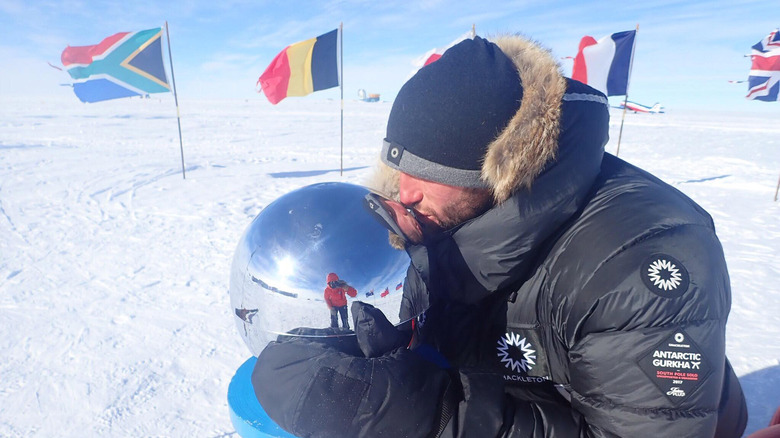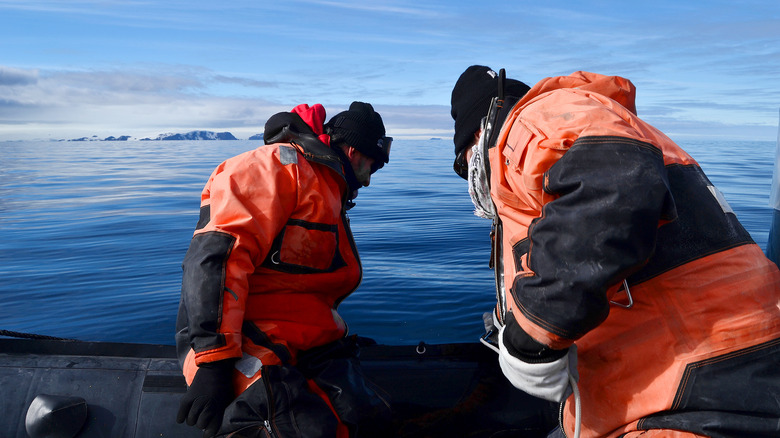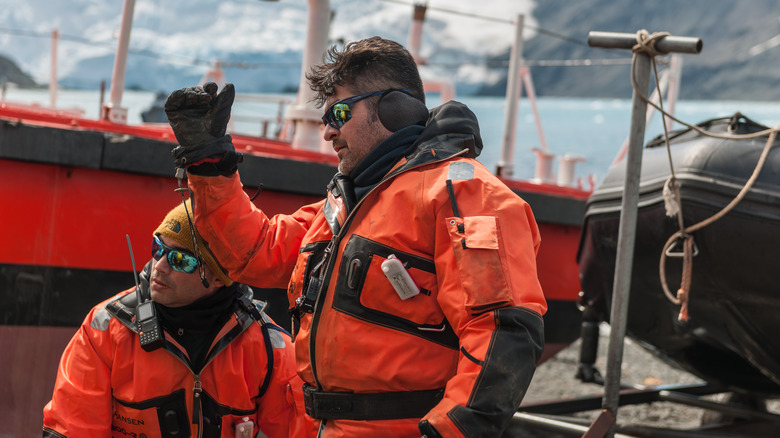Why Isolated Scientists In Antarctica Have Their Own Unique Accent
Antarctica occupies a weird place on the geopolitical map. Officially, sections of it are "claimed" by each of seven different nations, but neither the U.S. State Department nor many other countries recognize those claims. And of course, the U.S. has a significant presence there in terms of research stations and the scientists who work in them, but it does not make any "claim" to Antarctic soil.
We mention all of this because Antarctica doesn't function in the same way that a country like Germany or Cuba does. Though there are international agreements that govern what goes on there — mostly concerned with making sure that the pristine environment of the continent isn't polluted or contaminated — the place has no real government. Similarly, we've only been sending humans there for about a century, there have never been more than a few thousand people there at the same time, and there have only been a few babies born there.
Nevertheless, Antarctica has functioned as a nation in one specific way, and it's helped write new chapters in linguistics textbooks: People who have lived and worked there have come home with a new accent.
What Even Is An Accent?
Before getting too deeply into how Antarctica produced its own accent, a discussion of what even makes an accent is in order.
Broadly speaking, an accent is simply the way words sound when they come out of your mouth, as the Linguistic Society of America explains. Things such as the way you pronounce vowel and consonant sounds (or if you're capable of pronouncing them at all), the positions of the tongue and lips in the mouth in relation to each other, the order of words in which a sentence is constructed; all of these things, and others, define an accent.
One of the key factors that makes and maintains an accent is the speaker's contact with other speakers. Prior to mass communication, speaker groups were largely isolated, which allowed one accent to develop in, say, Newcastle, England, and another to develop in, say, Ypsilanti, Michigan.
Linguistics look at accents in two contexts. The first is accents within native speakers of the same language. The aforementioned Newcastle speakers and Ypsilanti speakers, for example, though they all speak English as a first language, are still going to have wildly different accents. The second context is that of speakers of foreign languages speaking a language they might not speak naturally. A native German speaker trying to speak English, for instance, is going to have a German accent.
It was this stew of isolation mixed with some foreign accents that led to the discovery of the Antarctic accent.
'Summerers' And 'Winterers'
The people who come to work on Antarctica come for a variety of reasons. Most are, of course, scientists, there to study climate change or astronomy or the continent's unique ecosystem. There are also the support jobs: trash disposal (which has to be handled with extreme care, in order to not contaminate the local ecosystem), housekeeping, maintenance, cooking, and so on.
According to Antarctic Glaciers, there are around 82 bases across the continent, including the South Pole station as well as multiple other stations, most along the continent's coasts. During the (relatively) hospitable summer months, there can be as many as 5,000 people there. It takes a special kind of person to brave the intense isolation and six months of dark Antarctic winter, however, and when the sun sets for good each year, only about 1,000 researchers remain.
Local parlance has called these groups "summerers" and "winterers." It was a group of winterers who, after spending some months together in isolation on the continent, came home with a new accent.
An Accent That Only 11 People Have
Back in 2019, the Journal of the Acoustical Society of America published the results of an experiment. The researchers secured the cooperation of 11 individuals who were going to be "winterers," and likened their isolation in Antarctica to "[a] present-day microcosm of former colonial settlement," noting that there would be no leaving, no new people coming in, and the speakers would only be speaking to each other. The 11 speakers included seven men and four women, all between the ages of 21-46; eight were born and raised in England, another in the Northwest U.S., one was a native Icelander (but who spoke fluent English), and another a native German (who also spoke fluent English).
The researchers recorded the winterers speaking a variety of words in their own accents before they left for Antarctica in 2017, and then used computer modeling to predict how they would speak when they left. Further still, the researchers conducted regular follow-up evaluations (via the internet) over the six months between March and August.
Sure enough, in the final analysis, the 11 winterers had managed to develop their own accent, as the computer models predicted, after spending six months in isolation together.
The Antarctic Accent
Describing the Antarctic accent — at least, that of the 11 test subjects who participated in the Acoustical Society of America experiment — is a bit of a fool's game. For one thing, it appears as if the recordings of the individual participants are not available online. For another, the science of linguistics, particularly when it comes to describing certain vocal sounds, is arcane and uses weird symbols and charts, and terms like "vowel fronting." And finally, the differences are so subtle that few except trained linguists are going to notice them.
Nevertheless, at least one key feature of the Antarctic accent is the aforementioned vowel fronting. The best explanation of the phenomenon occurs in this video, via Half as Interesting. As an example, the narrator points to a subtle change in the way the "oo" sound, such as in "food," is pronounced. Similarly, as reported by Scientific American, the winterers developed a slight vowel shift in how they pronounced the sound in the second syllable of the word "window."
So What Does This All Mean?
So, what's the significance of the development of the Antarctic accent, beyond it being a rather unique and interesting data point in the study of linguistics? Well, not much and quite a bit at the same time.
On the one hand, this experiment didn't exactly rewrite the entirety of our knowledge of linguistics, and indeed, according to Scientific American, it just confirmed what we already knew: that accents develop, at least in part, from social isolation and people within those isolated groups speaking to each other.
However, there are broader implications. For one thing, with the advent of mass media and greater mobility, regional accents — some of them, anyway — are dying out, according to CNN. Other accents are shifting and changing.
Of course, colonization is now a thing of the past, so gone are the days when a group of settlers claims a landmass, populates it, and their descendants develop their own accent. At least, that's true (for the most part) here on Earth. Humanity has set its sights on Mars, and missions there are going to last years if not whole lifetimes. When we send astronauts there to live in isolation with each other for years or even decades at a time, expect them to repeat the Antarctic researchers and develop their own "out of this world" accents.





